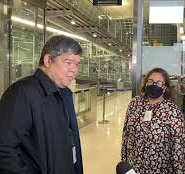MANILA, Philippines — The Philippine government is actively engaged in a large-scale repatriation effort after a major raid on a notorious online scamming operation in Myawaddy, Myanmar, triggered the exodus of over a thousand foreign nationals, including a significant number of Filipinos. The Department of Foreign Affairs (DFA) confirmed on Sunday morning that Filipino nationals were among those desperately fleeing the major online scam compound situated near the border with Thailand.
The operation, which targeted a sprawling facility known locally as KK Park—a location infamous for housing sophisticated transnational cybercrime syndicates—was reportedly conducted by local law enforcement on October 20th. This decisive action led to the immediate dispersal of workers, many of whom were trafficked victims coerced into running elaborate digital scams.

The Plight of Filipino Nationals: Rescue and Repatriation Efforts
The scale of the crisis facing Filipino citizens caught in the scam compounds is becoming clearer. The Philippine Embassy in Yangon has confirmed receiving a staggering total of 222 active requests for rescue and repatriation assistance from Filipino nationals trapped within Myanmar.
As of the latest reports, initial rescue efforts have yielded some success:
66 individuals were confirmed to have successfully crossed the border into Thailand.
Nine individuals managed to travel internally to Yangon and are now safely under the custody and protection of the Philippine Embassy.
The DFA stated that the Embassy is collaborating closely with Myanmar authorities to finalize the deportation procedures for those currently held in various camps following the raid. Concurrently, immense diplomatic pressure is being applied to facilitate the rescue of those who still remain trapped or hidden within the scam hub compounds.
This humanitarian and security crisis highlights the vulnerability of migrant workers to sophisticated human trafficking networks, which lure individuals with false promises of lucrative legitimate employment only to force them into operating online fraud schemes, often under duress and inhumane conditions.
Inter-Agency Commitment: G2G Channels Activated
The immediate response from the Philippine government involves a coordinated effort across multiple agencies to ensure the safe return of its citizens. The DFA is working hand-in-hand with the Department of Migrant Workers (DMW) and other relevant government bodies.
The commitment is focused on leveraging established Government-to-Government (G2G) channels with both Myanmar and Thai authorities. This bilateral and multilateral cooperation is crucial, given the complex legal and logistical hurdles involved in navigating cross-border rescues and deportations from a conflict-sensitive region like the Myanmar-Thailand border.
The agencies are specifically appealing to their counterparts to expedite the process, recognizing the time-sensitive and dangerous nature of the situation for the stranded Filipinos. Repatriation logistics—including documentation, exit clearances, and the provision of air travel—are being prepared in anticipation of a large influx of returning nationals.
The Shadow of Cybercrime: Myanmar’s Expanding Scam Industry

The Myawaddy incident is a stark reminder of the escalating global threat posed by cybercrime syndicates operating primarily out of conflict zones and poorly regulated areas in Southeast Asia. These operations, which traffic thousands of victims from across Asia and beyond, generate billions of dollars through sophisticated scams, including cryptocurrency fraud and “pig butchering” schemes.
The raid on the notorious KK Park complex is believed to have disrupted a major node in this illicit industry. Local reports indicated that the area saw a frantic rush to escape, with more than 1,000 foreign workers attempting to flee immediately following the law enforcement action. The subsequent confusion along the Thai border region has made tracking and identifying all Filipino nationals particularly challenging for embassy officials.
The Philippine government’s ongoing monitoring of the situation, which commenced immediately after confirmed reports of the October 20th operations, underscores the commitment to addressing this transnational crime head-on. The priority remains ensuring that all Filipino victims of trafficking are brought home safely and swiftly.
Future Focus: Accountability and Prevention
Beyond the immediate repatriation efforts, the incident is expected to intensify the government’s campaign against human trafficking and forced labor related to cyber scamming. Authorities will likely focus on:
-
Prosecuting Recruiters: Identifying and prosecuting the local Philippine-based recruitment agencies or individuals responsible for illegally trafficking citizens to Myanmar.
Increased Awareness: Launching more robust public awareness campaigns to warn Filipinos, especially those seeking work abroad, about the deceptive tactics used by scam syndicates.
Diplomatic Pressure: Sustaining diplomatic engagements to encourage regional partners to dismantle these criminal networks that often operate with impunity.
The successful return of these 222 individuals will be a critical measure of the inter-agency coordination and diplomatic strength of the Philippines. For those still trapped, every moment is critical, making the DFA’s plea to expedite the G2G process an urgent call for decisive international action.





